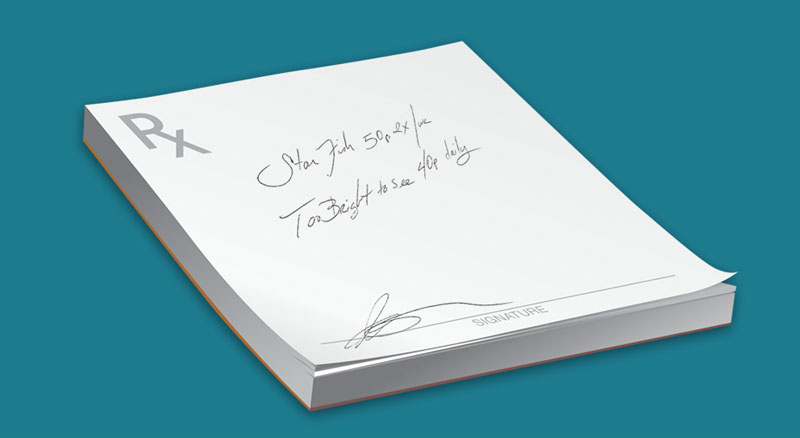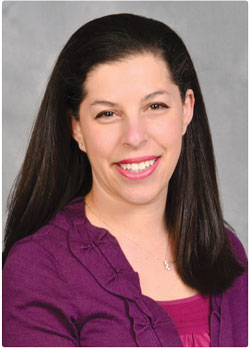A Powerful Prescription: Pediatrician Uses Books to Connect with Kids
New York doctor Jaclyn Sisskind shares the positive impact books have made on her patients and her concern for the harm of book bans.

Looking at my day’s schedule, I did not recognize a patient’s name. My colleague leaned over my shoulder, looked at my screen, and sighed.
“That teen? She’s a tough one,” she said. “She has multiple school absences and just started living with her aunt, because her mother is not able to care for her anymore. She comes in often with vague complaints.”
 |
Jaclyn Sisskind |
The real problem, my colleague believes, is that the teenager is lonely.
When the appointment began, I listened to the patient’s history and started my exam. As I moved my stethoscope from her chest to her back, I asked, “What books do you like?”
She rolled her eyes a little and replied, “Oh, I hate to read.”
I moved to her neck, checking for swollen glands.
“Maybe you need to read a book about a kid who is just like you,” I said.
She was quiet for a beat, and then looked right at me, her eyes serious over her mask, “I’d like that,” she said.
I sat down beside her.
“What would that book look like? A book about a kid like you?”
“Well, she would have to be super funny. She would be really smart, even though everyone assumes she isn’t smart at all. She would be fun to hang out with, but sometimes she would make bad choices. Oh, and her hair would be amazing!”
I laughed. “I have a book like that for you. Do you want to read it?”
She nodded, so we pulled the library website up on her phone and searched for With the Fire on High by Elizabeth Acevedo.
I gave my pitch: “This girl is super funny and so smart. People underestimate her. She is wildly creative and talented. She lives with her grandmother, is in high school, and has a little daughter.”
“For real?”
“For real. Plus,” I added, “look at the cover. Her hair is amazing!”
Her eyes smiled at me, and she said, “I am going to read this book, and the next time I see you, we are going to get into it!”

Permission to open up
I ask every patient I see what they are reading. It’s my magic trick. It catches kids off guard and opens the door for them to talk about themselves, their interests, and their imagination. It is a tool to crack open the shell, just a little, while I check their ears, monitor their growth, and ask about school. Talking about books shows the value I place on reading, while getting to know my patients better.
Books are a connection point for me. Recommending one that acts as a mirror to a patient demonstrates that I value them. It sends the message that I see them as an entire person, not just a diagnosis. I am listening to them and taking the time to deepen our relationship. I have used books to make kids laugh, to help kids process hard times, and to let kids know they are not alone. With one particularly closed-off patient, talking about a book we both read gave her permission to open up to me, allowing me to finally care for her.
I am deeply distressed by the rise in literature challenges across our country. My patients have told me that certain titles allowed them to feel, for the first time, that they are valid. Worthy. Not alone. What will they do without access to those voices? What message does it send if a book is labeled “inappropriate” when they have seen themselves in those pages? What does that tell someone who has been informed that this book, which mirrors their life, is unacceptable to others? What happens if I tell a patient a book will help them, but when they go to their school or local library, it is not there?
Banning books puts children at a disadvantage by giving them a skewed, inflexible, unrealistic view of the world. At its worst, it erases some children entirely. All children deserve to feel seen and be represented. When kids see themselves in a story, they learn to value and respect themselves. When they use a story to step into someone else’s experience, they learn to value and respect everyone. They learn empathy and acceptance. Every pediatrician wants that. I want my patients to leave the office feeling important and knowing their story is worth telling.
Last year, I saw another teen patient for a well visit. Her mom had died a few years earlier. Since then, the teen had felt lost and alone. She told me school was not great. She could not focus. She said she hated her weight, hated her body. She is bisexual and did not know how to tell her dad. She was tired of COVID, tired of bad news every time she looked at her phone. She told me she was tired of everything.

So, I wrote a prescription
• Starfish by Lisa Fipps, for her body image.
• Red, White, and Whole by Rajani LaRocca, for losing her mom.
• Too Bright to See by Kyle Lukoff, for the journey of discovering who you are.
• Donuts and Other Proclamations of Love by Jared Reck, for vulnerability.
• I’ll Give You the Sun by Jandy Nelson, for loss and finding your voice.
• Flamer by Mike Curato, for choosing yourself.
• We Dream of Space by Erin Entrada Kelly, for finding strength in bad news.
Of course, I did all the “doctor stuff,” too. But in talking about books, I listened to her and acknowledged where she was, that her struggle was real, that it hurt and was not fair, that she was not alone. She agreed to see a therapist and looked a little less burdened when she left.
A few months later, she sent me a message: Therapy is good. The books are better. I’m going to keep trying.
Thank goodness all of the titles were available to her.
So many of you—librarians, teachers, and authors—are working to fight book bans and connect every child to the book they deserve. To all of you, thank you. I stand with you. Your books are important and need to be read. My patients need you. I need you. Keep trying. n
Jaclyn Sisskind is an associate professor of pediatrics at SUNY Upstate Medical University.
RELATED
The job outlook in 2030: Librarians will be in demand
The job outlook in 2030: Librarians will be in demand
ALREADY A SUBSCRIBER? LOG IN
We are currently offering this content for free. Sign up now to activate your personal profile, where you can save articles for future viewing





Add Comment :-
Be the first reader to comment.
Comment Policy:
Comment should not be empty !!!